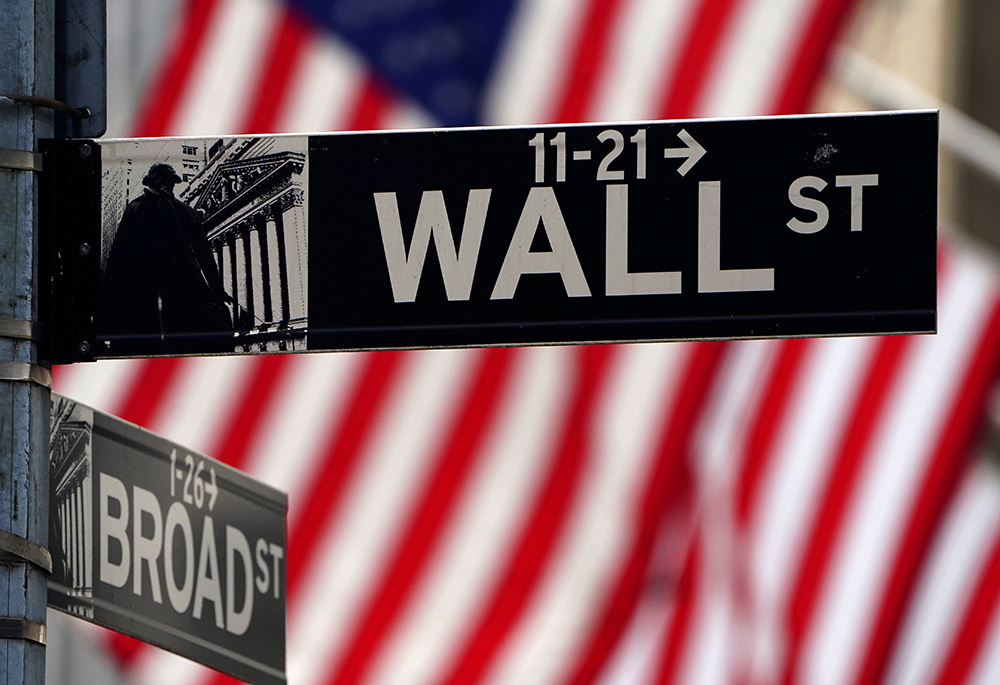
The Wall Street sign is pictured outside the New York Stock Exchange April 16, 2021, in New York City. (OSV News/Reuters/Carlo Allegri)
After all those stock market upheavals of Aug. 5, not to mention that day's federal court ruling that Google violated antitrust law, now six Catholic investment funds are dealing with their own kind of upheaval.
The six funds, along with eight other faith-based investment services — part of a group of 130 investment and retirement fund services — were sent a letter July 30 from the Republican-led House Judiciary Committee, declaring that "the Committee has uncovered evidence that financial institutions are colluding with climate activists through initiatives like Climate Action 100+ to adopt left-wing environmental, social, and governance (ESG)-related goals, potentially in violation of U.S. antitrust law."
All 130 groups that were sent identical letters are members of Climate Action 100+, which seeks to apply shareholder pressure on companies to adopt more ecologically sustainable practices, and whose members controlled a combined $68 trillion in assets.
What's more, the letter told the investment groups to not destroy any documents or communications related to the committee's inquiry, which began in February — and to respond to the letter by Tuesday, Aug. 13.
The Catholic investor groups are Christian Brothers Investment Services, Loyola Marymount University in Los Angeles, Investor Advocates for Social Justice, Mercy Investment Services, Seventh Generation Interfaith Coalition for Responsible Investment and the Sisters of St. Dominic of Caldwell, New Jersey.
A month after the committee's investigation began, some big-name investment firms pulled out of Climate Action 100+, including Invesco, J.P. Morgan and State Street, cutting the value of the Climate Action 100+ portfolio by 25% (BlackRock also transferred its membership to BlackRock International). However, some high-profile names in finance remain, including Goldman Sachs and Mellon Investments.
The Judiciary Committee's move is "truly a political act," said Matt Orsagh, a sustainability and ESG expert with two decades in finance, most of which has been spent integrating ESG factors into investment decision-making.
"It's a kind of form of bullying and intimidation," Orsagh added. If there were prohibitions on the use of ESG in making investment decisions, "that would ultimately harm investors," he said. "It will impact their investment," because investment groups would be "making decisions with too little information."
The Judiciary Committee would beg to differ. An interim staff report on the inquiry released in June, titled "Climate Control: Exposing the Decarbonization Collusion in Environmental, Social, and Governance (ESG) Investing," declares, "Climate Action 100+ Bullies and Threatens Asset Managers, Weaponizing Their Clients to Force Them to Join and Obey the Climate Cartel."
The report's executive summary said in part that its inquiry was about finding "apparent collusion between left-wing activists and major financial institutions to impose radical environmental, social, and governance (ESG) goals upon the American people. This collusion not only violates fundamental free market principles, it also threatens to raise costs and reduce choice for millions of American consumers."
Advertisement
It also identified Climate Action 100+ as being part of the "climate cartel," along with other organizations such as: "blue state pension funds like the California Public Employees' Retirement System," frequently referred to as Calpers; asset managers like the Vanguard Group; foreign-owned proxy advisers; stockholder engagement service providers; activist investor groups; and "radical environmental non-profit organizations like Ceres," whose homepage describes its mission as "working to accelerate the transition to a cleaner, more just, and sustainable economy" by "changing markets and sectors from the inside out."
One of the investment groups receiving a letter, Seventh Generation Investments, has in its investment portfolio more than 40 faith-based institutions, according to Patrick Carolan, Catholic organizer for Vote Common Good.
"This includes close to 25 communities of Catholic sisters," Carolan said in an open letter written after the Judiciary Committee's missives were sent. "The Republicans' anti-Catholic bias is on full display when they refer to Catholic nuns who have dedicated their lives to serving the poor, feeding the hungry and caring for creation as a 'woke cartel' and 'a climate cartel' of left-wing environmental activists. It is a move that is clearly an attempt by the Republican House to attack and intimidate Catholic and other faith organizations who are acting on their religious beliefs centered around Catholic social teaching."
Socially responsible investing is hardly new among Catholics. The U.S. bishops issued guidelines on socially responsible investing in the 1990s. The most recent revision to those guidelines, in 2021, expanded the section on investments related to the environment. And Pope Francis' 2015 encyclical, "Laudato Si', On Care for Our Common Home," referred to the path toward solving Earth's environmental concerns as "integral ecology." In it, Francis speaks extensively about the role of economic and financial power in living out those teachings.
"The law is pretty clear that investor collaboration to address concerns about the long-term financial risk of climate change does not in any way run afoul of the antitrust laws," said one finance industry executive familiar with the shareholder resolution process who asked for anonymity with the inquiry still in progress. "That, however, does not stop political opponents from using antitrust as a cudgel to chill lawful activity to address climate change."
The executive added, "This is coming from political opponents who refuse to recognize the global scientific consensus regarding climate change. And when you're questioning established science in the face of a clearly warming planet, it's very difficult to have a rational conversation regarding climate policy."
The Judiciary Committee, which changed into Republican hands in 2023, conducted hearings on ESG particulars last summer. Earlier in the year, during what activists call "proxy season," their shareholder resolutions calling for carbon reductions and other climate-friendly practices from the companies in which they've invested fared worse than in 2022 after the votes were tallied.







